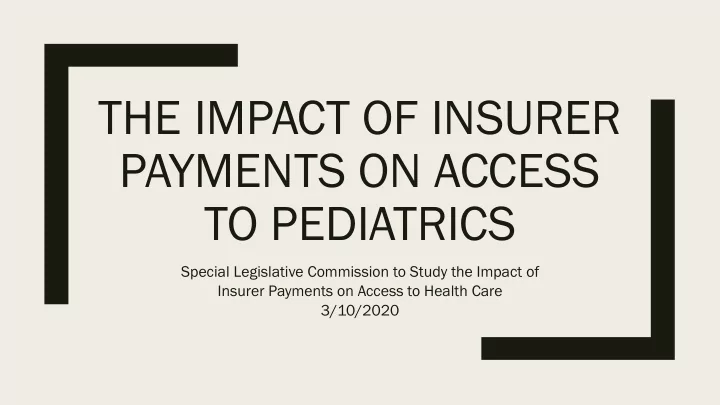

THE IMPACT OF INSURER PAYMENTS ON ACCESS TO PEDIATRICS Special Legislative Commission to Study the Impact of Insurer Payments on Access to Health Care 3/10/2020
Medicaid Landscape in Rhode Island for <18 ■ Rhode Island’s pediatric medical care is delivered in a hybrid system, with 50% of children obtaining medical care in private practices, and 50% at FQHCs. – There are ~215K children in Rhode Island – roughly 20% of our population – 38% or ~80K are Medicaid beneficiaries – ~40K receive care from private community-based pediatric primary care providers ■ This hybrid system has served the State well and allowed Rhode Island to lead national pediatric measures in vaccination rates (primary series as well as HPV, influenza and Meningococcal Conjugate/Tdap) and mental health / developmental screening.
The Affordable Care Act - Medicaid Expansion – Medicaid Payment Parity ■ In 2010, the writers of the federal government’s Affordable Care Act (ACA) legislation recognized that the historically low fee-for-service Medicaid rates would hinder the success of a planned Medicaid expansion. ■ They understood the proposed Medicaid expansion would cause an access crisis – Who could d afford d to t take in these new p patie ients ts at such a low reimb mburseme ment t rate? ■ Solution: ion: The ACA legislation included an increase for Medicaid payment rates for primary care services (to at least those paid by Medicare) for calendar years 2013 and 2014. ■ Unfortunately, Medicaid payment parity did not continue after 2014 and RI’s privat ate communit unity-base ased d primar mary y care provider iders s are reimburs ursed d at ~40% of Medicare are (rank nked d 50th in the natio ion n and last in New England) nd)
Why is a Medicaid rate increase for primary care important? ■ Reinvestment in our private, community-based patient-centered medical home practices is critical to delivering high-quality, low cost care. ■ Private pediatricians spend more time with Medicaid beneficiaries; providing services such as: – Developmental / BH Screening – Direct behavioral health management and/or coordinating behavioral health services – Prevention Initiatives – Solving social determinants of health challenges – Coordinating care team resources (nurses, pharmacists, behavioral health clinicians, care navigators, nutritionists, lactation consultants and data management personnel) ■ Investment in pediatric practices is critical to providing comprehensive care
Why increase Medicaid reimbursement rates to primary care? ■ Primary Care presents the greatest opportunity for Rhode Island to reach its population health objectives of: – Providing timely access to high-quality medical care – High achievement in quality metric targets – Reducing the overall costs of Rhode Island's Medicaid program – Upfront investment creates long-term savings by developing a healthier population ■ Primary care is the beating heart of our healthcare system – We are the e first-line line pro rovider iders that at can iden entify tify clinical ical needs – We have systems in place to ensure patients are engaged – We organize referrals and coordinate care with all specialties and services – There is no other entity in our healthcare system that can have a greater clinical and financial impact on our Medicaid system – leverage us!
If We Don’t Act ■ At 40 cents on the dollar, RI’s private practice pediatricians will not be able to care for more RItecare insured children ■ Pediatricians across the state are having to make difficult decisions to either close their practices or significantly limit access for RItecare insured children ■ RI has an aging pediatrician workforce (avg. 54 years), it is important to attract new physicians to work in our state – given the low Medicaid payments, pediatric practices are simply unable to attract new pediatricians to Rhode Island ■ Through attrition in RI’s pediatric workforce, our care delivery system risks the loss of local access to pediatric healthcare, as well as the loss of the health successes achieved to date in vaccine administration and behavioral health/developmental screening rates, all of which support a healthy population.
Our Request to the Committee ■ Permanent Medicare parity for Medicaid reimbursement – Across the country, with leadership from the AAP, states have passed laws that require Medicaid payment parity with Medicare, which would more than double current payment for Medicaid in RI in the private practice setting. We have seen successes in CT, NY, CA, GA, NC and FLA. – Obviate attrition in RI’s pediatric workforce – This is essential for the sustainability of Rhode Island’s community -based primary care pediatric providers and vital to Rhode Island achieving its population health objectives.
Sources ■ 2018 Rhode Island Kids Count Factbook: https://rikidscount.org/Portals/0/Uploads/Documents/Factbook%202018/2018%20Fa ctbook%20-%20no%20art.pdf ■ https://www.medicaid.gov/state-overviews/stateprofile.html?state=rhode-island ■ Kaiser Family Foundation: http://files.kff.org/attachment/fact-sheet-medicaid-state-RI ■ Kaiser Family Foundation: https://www.kff.org/medicaid/state-indicator/medicaid-to- medicare-fee-index/?currentTimeframe=0&selectedDistributions=primary- care&sortModel=%7B%22colId%22:%22Primary%20Care%22,%22sort%22:%22desc%2 2%7D ■ American Academy of Pediatrics: https://www.aap.org/en-us/advocacy-and-policy/state- advocacy/Pages/Medicaid-Payment-Increase.aspx
Recommend
More recommend